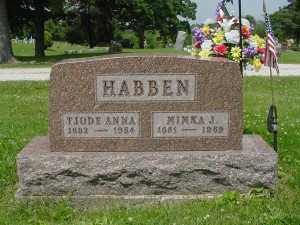
Tombstone of Tjode Anna and Mimka J Habben, Moss Ridge Cemetery, Carthage, Hancock County, Illinois.
The spelling of names and the name to use for an ancestor can be a confusing business. People whose names were from a foreign language, who used variant spellings, or who used diminutives based upon their name compound the issue. It is even worse when an individual does all three.
I was told by another researcher that I was using the “wrong name” for my great-grandfather, Mimka Habben. It was indicated that the correct spelling for his name is “Mimke” and that’s how I should spell it. I should spell it correctly and not deviate from the traditional spelling.
Well…
I am spelling it correctly. I’m spelling it the way great-grandpa Habben spelled it. After all, it was his name. It was not my name and it was not my correspondent’s name. Great-grandpa was probably the first in a long line of “Mimk*s” to spell it with an “a.”
Mimka Habben’s ancestors of the “same” name were referred to in church and other records as Mimke or, when it was their patronym, Mimken. Occasionally a bored pastor with extra time and extra ink would throw in a “c,” resulting in Mimcke or Mimcken. When that’s how the name is spelled consistently, then I should use that spelling. But that’s not how Great-grandpa Habben spelled his first name: it was Mimka.
It may seem like a trivial matter, but our job as genealogists is to tell our ancestor’s story as accurately as we can and not try and standardize as much as possible. A name is one thing about our ancestor that makes them unique. Because great-grandpa used the “a” and not the “e,” then that’s what I am going to do. It’s not always possible to have an idea of which name spelling an ancestor preferred. In those cases we have to standardize. This is not one of those situations.
If there’s the occasional document where his first name is spelled in another way, then I will transcribe that document as it is written. because that is how documents are to be transcribed. Transcribed documents are not “corrected” because correcting them does not reflect the document as it was written. If a census refers to Mimka as “Mimke,” then that’s how I will transcribe that census record. But when writing about Great-grandpa Habben in a general sense or not when analyzing a specific record, I will use Mimka.
The reasons are fairly simple. That is how Great-grandpa signed his name on every legal document I’ve ever seen. His daughter indicated that he subscribed to the Chicago Tribune for years, so I’m concluding that either he was wasting money all that time or was reading the newspaper. Because he was literate, I’m pretty certain he knew how he was spelling his name when he wrote it. “Mimka” is also what is on his tombstone. And while tombstones are not always correct, I’m reasonably certain his was erected after his wife’s death and before his own, so he probably knew what was on his stone.
Those are the reasons stemming from my great-grandfather himself. His children provide additional support for the “a” spelling. His son had Mimka as a middle name and that was how he spelled it. When my grandmother labeled photographs of her parents, that is how she spelled her father’s name. Those pieces of information support the spelling of his name, but are not as important as the records Mimka himself signed.
Of course his name was spelled wrong in several records. No one’s name is spelled the same in every document in which they appear (except maybe for a man named John Smith, but even that can be messed up). For part of Mimka’s life, he went by his initials (M. J.) or the diminutive “Mink.” I’ve noted that in my genealogical database, but do not use those renderings when I’m discussing him.
Of course there are times when one can’t be reasonably certain of the preferred spelling. I’ve got other ancestors who were probably semi-literate or who never signed their name on any piece of paper. For those, I chosen whatever spelling was standard.
The is not one of those times.
The “correct” spelling may be Mimke.
But I’m going to use “Mimka.”

No responses yet